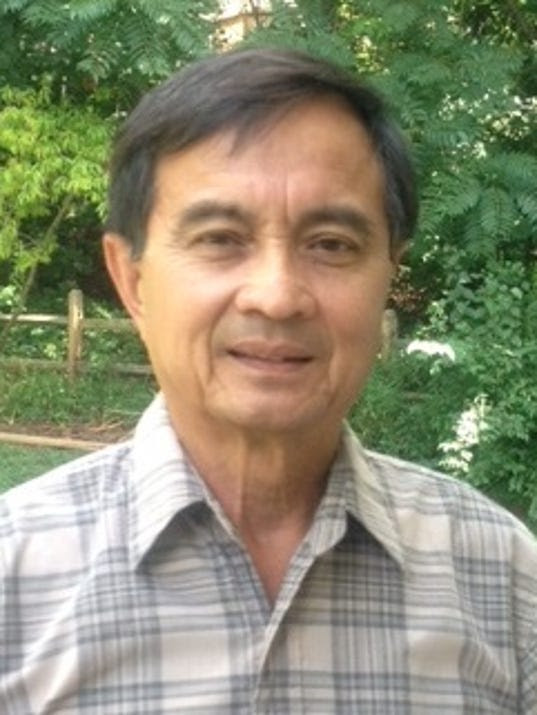Chuon Nath’s vision of the Khmers
Posted by: Cambodian | Posted on: February 25, 2016
Peang-Meth(Photo: PDN file)
Watching the snow piles that line streets and parking lots here, refusing to melt in the cold winter sunshine, my thoughts wander to Ypao Beach where more than a decade ago I swam, watching the coconut leaves dancing against the backdrop of a blue sky, and to decades earlier when I sat on the floor with my father to hear the Buddhist sermon broadcast on state radio.
Now in my seventies, I still hear the Buddhist preaching, “There has to be evil so that good can prove its purity above it.”
In this world of blame and denial, I am more than ever attracted to the words of French Renaissance statesman Michel de Montaigne: “There is no man so good that if he placed all his actions and thought under the scrutiny of the laws, he would not deserve hanging ten times in his life.” And to the words of one of my favorite American presidents, Theodore Roosevelt: “There is not one among us in whom a devil does not dwell; at some time, on some point, that devil masters each of us. … It is not having been in the Dark House, but having left it, that counts.” Roosevelt counseled, “Do what you can, with what you have, where you are.”
————–
PACIFIC DAILY NEWS
Be thoughtful and imaginative
The son of Khmer farmers in Kampong Speu, Chuon Nath grew up to become a Buddhist monk, an author, a composer, a poet and the head of a Khmer Buddhist reformist movement, the Dhammayuttika Nikaya, a model of Buddhism that relies on reason and intellectual conception as valid bases for action and belief. This “rationalist-scholastic model” influenced young Khmer monks in the early 20th century during France’s colonial rule in Cambodia.
Revered as “probably the most famous and most knowledgeable monk Cambodia had ever had,” Chuon Nath became an ardent protector of the Khmer identity, culture and history, and a conservator of the Khmer language. In 1948, at age 65, he was elevated to be the kingdom’s supreme patriarch of the Maha Nikaya with the title Samdech Preah Moha Sumetheathippadei (“wise lord”) Chota’nhea’nor Chuon Nath, a de facto leader of Khmer Buddhism.
A “master of Khmer literature,” Chuon Nath’s innovations included printed sacred texts (replacing hand-inscribed palm-leaf writings), the translation of Buddhist Pali canon into the Khmer language, the introduction of Khmer Buddhist monks to higher learning in Pali and Sanskrit studies, the modernization of Buddhist teaching methods. In 1915 (at age 32) Chuon Nath became a member of the committee by the Kingdom’s royal order to compile a Khmer dictionary.
I found a rare photo of the devoted middle-aged Buddhist monk, sitting on the floor amid a pile of papers, working on compiling a dictionary. The first edition of that dictionary was published in 1938. Two years before his death, Chuon Nath was awarded the rank of “doctor.” The composer of the Kingdom of Cambodia’s national anthem, “Nokor Reach,” and several patriotic ballads, Chuon Nath invigorated Khmer nationalism.
In the national anthem and in the many ballads Chuon Nath composed, he called on all Khmers to unite, to remember the Khmer nation’s greatness and to rejuvenate their determination to rebuild Cambodia to become what she once was, with highest national values.
I find three of his ballads particularly memorable. Published versions of the lyrics differ slightly, but the thoughts expressed are consistent. Many of my generation remember the song, “Daen Dei Khmer,” or “Khmer Land,” which as school children we sang proudly, and which came on air on state radio every morning at 6, telling us of the “Golden Land” where inhabitants live harmoniously, and when the territory is aggressed they rise up to protect the land. The other two I most recall are “Pong Savda Khmer,” or “Khmer History,” and “Chun Cheat Khmer,” or “Khmer Citizens.”
Anticipating the interest of many of my countrymen, I’ve put together a PowerPoint — “Pong Savda Khmer” — that is accompanied by Samdech Chuon Nath’s compositions. The lyrics are included among the slides, which are posted onYouTube.
The presentation provides a reminder of the historic call for unity and appreciation for Cambodia’s past achievements, especially in the arts and philosophy, and recalls the great and peaceful nation Cambodia has been and should be.
“Our lands and waters were wide and well known; other peoples praised and considered our Khmer race as an elder race,” say the lyrics, “Our civilization excelled and spread far and wide in the Far East.” The ballad calls on Khmers to “strengthen a determination in body and mind, try harder to rebuild Khmer national values and to rise again to the greatness we once had.”
Readers may also want to log on to another Power Point at www.youtube.com/watch?v=
Gaffar Peang-Meth, Ph.D., former deputy chief of general staff of the Khmer People’s National Liberation Armed Forces, taught political science at the University of Guam for 13 years. Retired in 2004, he now lives in the U.S. mainland. He can be reached at peangmeth@gmail.com












Comments are Closed